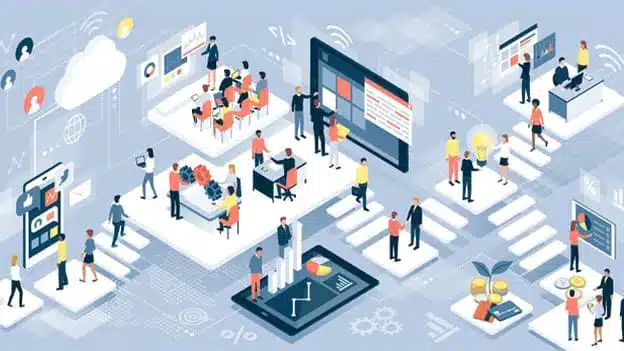The future of work is evolving at an unprecedented pace, driven by technological advancements, shifting workforce demographics, and shifting employee expectations. For TA and HR professionals in the US, staying ahead of these trends is critical in attracting, retaining and developing top talent. So, we thought we’d shed some light on the key trends that are shaping the future of work and their impact on HR and recruitment:
Remote and hybrid work models
The pandemic accelerated the adoption of remote work, and it’s clear that this trend is here to stay. Many organizations have embraced hybrid work models, something that has become normal despite its relative newness. As we all know, this model means employees can split their time between the office and remote locations. This shift requires HR to rethink policies and practices to support a more distributed workforce. Investing in collaboration tools and platforms that facilitate remote work is essential. Additionally, developing strategies to keep remote employees engaged, connected, and ultimately negate loneliness, as well as implementing policies that promote a healthy work-life balance for remote workers, are key considerations.
Emphasis on employee well-being
Employee well-being has become a top priority for many organizations. The pandemic highlighted the importance of mental health and overall well-being, leading companies to invest more in wellness programs than ever before. HR professionals need to maintain focus on providing access to mental health resources and counseling services, offering flexible schedules to help employees manage their personal and professional lives, and implementing programs that promote physical, mental, and emotional well-being.
Diversity, equity, and inclusion (DEI)
Diversity, equity, and inclusion have evolved far from being buzzwords; they are essential components of a successful workplace. Companies are increasingly recognizing the value of a diverse workforce and the need to create an inclusive environment. HR can drive DEI initiatives by ensuring recruitment processes are free from bias and promote diversity, providing training to employees and leaders on diversity and inclusion, and tracking and reporting on diversity metrics to assess progress and identify areas for improvement.
The rise of gig economy and freelance work
The gig economy is growing, with more professionals opting to freelance and take on contract work. This trend offers flexibility for workers and access to specialized skills for employers that may not require a full-time hire. HR and recruitment teams must adapt by developing strategies to integrate gig workers into the workforce, ensuring compliance with labor laws and regulations related to gig work, and providing a sense of belonging to contractual workers.
Technological advancements
Advancements in technology, particularly artificial intelligence (AI) and automation, are transforming HR and recruitment processes. These technologies can help streamline operations, improve decision-making, and enhance candidate experience. Key areas of focus include using AI to screen resumes, match candidates, and reduce hiring bias. Additionally, automating repetitive HR tasks frees up time for strategic initiatives, while leveraging data provides insights into workforce trends for informed decision-making.
Continuous learning and development
The rapid pace of change in the workplace means that continuous learning and development are more important than ever. Employees need to constantly update and refine their skills to stay relevant and in-demand in a competitive market. HR can support this by providing access to online learning platforms and resources, offering programs to help employees develop new skills and advance their careers, and creating clear career paths and opportunities for growth within the organization.
A growing focus on employee experience
The employee experience encompasses all aspects of an employee’s journey with an organization. Literally from recruitment to retirement. A positive employee experience can lead to higher engagement, productivity, and retention. HR can enhance the employee experience by creating a comprehensive onboarding process that helps new hires feel welcomed and integrated, implementing regular feedback and recognition programs to show employees they are valued, and designing a work environment that supports collaboration, innovation, and well-being.
Looking ahead
The evolving future of work will transform how we attract, retain, and develop talent. For TA and HR professionals, this is a pivaral moment of both challenge and opportunity. The trends we’re seeing aren’t just fleeting changes, but a fundamental shift in how we think about work.
As we navigate this transformation, the ability to adapt and innovate will be crucial. HR and recruitment professionals are at the forefront of the shift, with the power to shape workplaces that are not only efficient, but also enriching and inclusive. This is about more than just keeping up with the latest trends but about reimagining the very fabric of our work environments to ensure they are places where everyone can thrive.
So, as we look ahead, business leaders will need to embrace these changes with a mindset of growth and possibility. The future of work focuses on creating meaningful, supportive, and dynamic environments, not just workplace logistics. Are we ready to take on this challenge and lead the way into a new era of work? The answer will define not organizational success, but the well-being and fulfillment of our workforce.










